Only to say as it really was
Hi there, I write to you at 1:30 from my new Ryoukan in Fukuoka.
I might get a bit history-y here, so for those of you not inclined to that sort of thing you can skip to the pictures.
Yesterday was my last day in Nagasaki, and I spent it quite happily as a shameless tourist. To westerners, the name Nagasaki usually only rings bells in its connection to Hiroshima. It has secured its place in history by being the second of the only two cities in the world to have experienced the horrors of the atom bomb. It is this Nagasaki I explored for the second half of my day, it is an older Nagasaki I explored for the first.
In Japan Nagasaki is known for being the first port to open to the western world. For a country known for it insularity, Japan has a surprisingly old and deep connection with the West. As early as the 8th century Japanese aristocrats possessed goods from Rome and Greece, brought via cultural exchange with China. In the 15 hundreds, not long after the dawn of the colonial era, Portuguese ships found Japan and hoped to spread Christianity and made some money - the two have often gone together. Nagasaki was the city that received them. The Portuguese eventually left as a ban was placed on missionary work - the Japanese shogun thought this foreign God a rival for people's loyalty, and only the Dutch - obviously - were willing to stick to trading. The people of Nagasaki kindly built a manmade island for the Dutch, to keep them off the sacred mainland. I visited this:
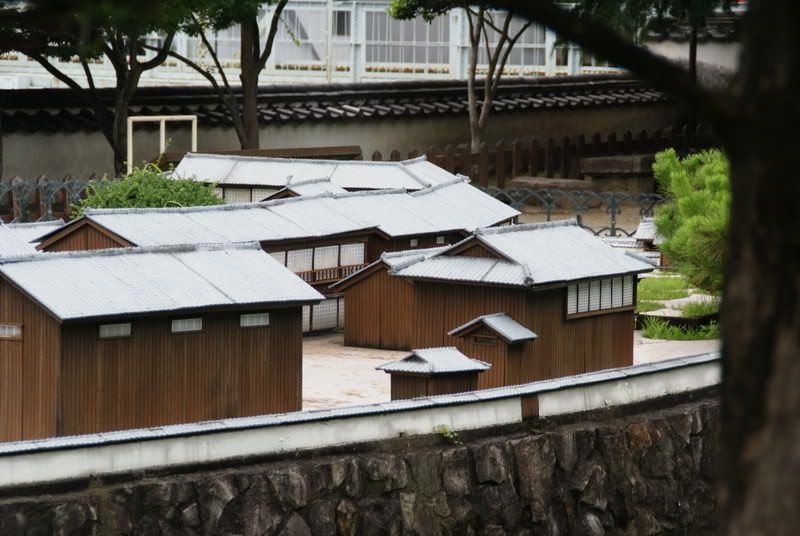
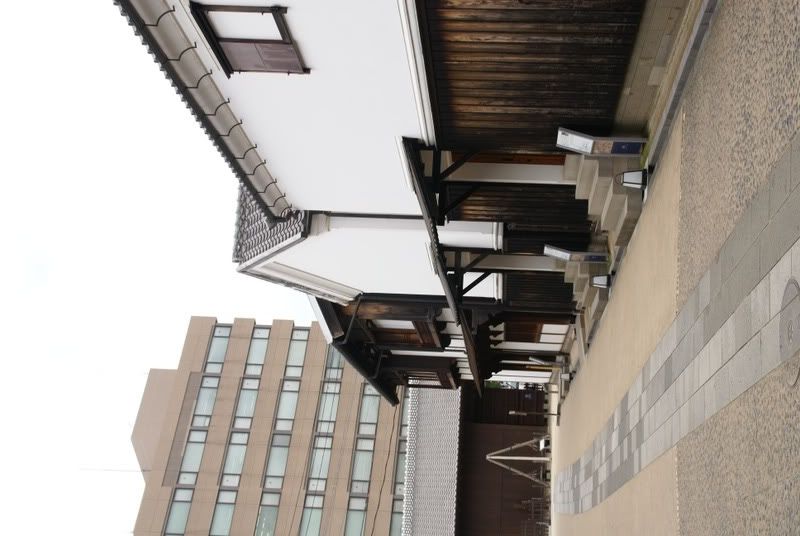
Later when Japan was opened (at the point of the American gun) to the West as a whole, Nagasaki remained something of an international hub. I visited Glover Park, a large park with Western houses built by English expats in the late 1800s:
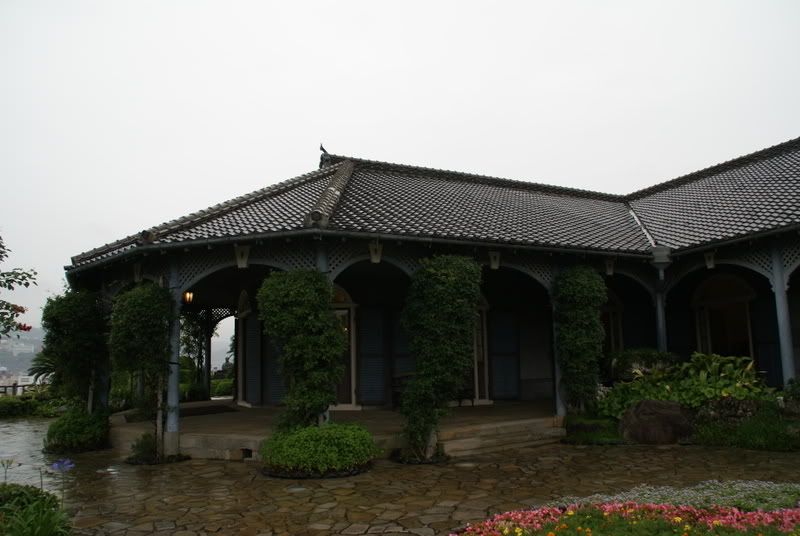
It may sound a bit silly, but I suppose I feel some kind of connection to these early Ango-Japanese cultural ambassadors and find the topic of Japan's relation to the West as a whole one of great personal, as well as academic, interest.
So that's old Nagasaki, a rather beautiful city which at one point was full of European architecture and a rather liberal meeting point of cultures. A strange target for a bomb that was aimed at Japanese ultra-nationalism.
I went to ground zero, the spot where the bomb was dropped, it's marked tastefully by a simple black monolith:
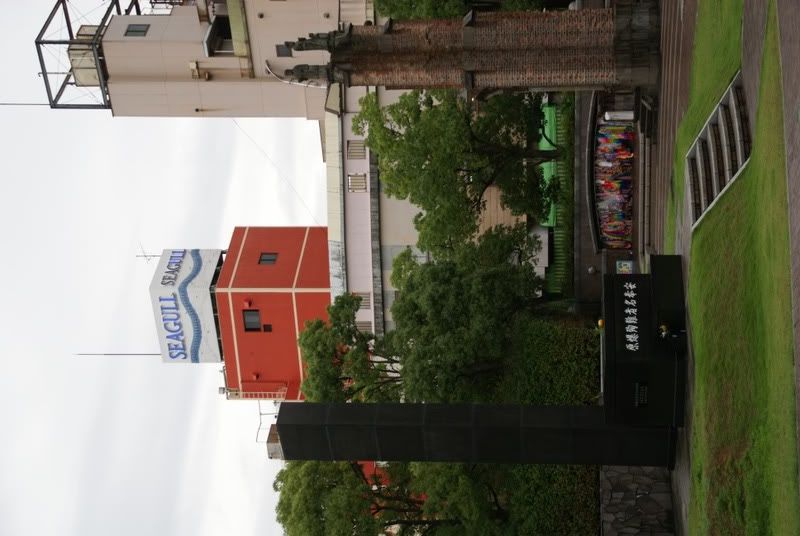
As you look around and see the clean, tacky, lively, touristy, ugly, friendly city that surrounds you it's surreal and not a little depressing to think of the wasteland created here 63 years ago. The rain was certainly fitting. I then went to the Atomic Bombing Museum, it was nearly closing time so I had to - I just stopped myself using the term blitzkrieg - hurry, and I didn't get a chance to read the testimonials and the like. It was all done, for the most part very factually, simply saying the events as they happened, and letting the pictures and artifacts speak the tragedy for themselves. It was very moving. But the historian in me can't stop thinking.
I was annoyed at the way the events were not put into a context. Certainly the tragedy of the bombing deserves recognition by itself but to not to talk of the War as a whole, to not talk of Japanese actions in China, Korea, Taiwan etc. is to paint the Americans as "inhuman" (this world was used in the museum) monsters which surely they were not. On the one hand you have the gut instinct, the common sense approach as it were, which no doubt all decent people feel when they see the images of the charred corpses and the birdseye photos of before and after, when the think about the 150,000 people - I won't here imply that the lives of women and children are worth more than those of men as the museum seemed to in quoting their figures separately - is that this was a needless tragedy, never ever again. But there's the historian. Would an American invasion have been preferable? Had the war not ended then, had it dragged out longer, the Russian's would have certainly been able to build a stronger case in favor of them having an involvement in the occupation - was it Hiroshima and Nagasaki that allowed Japan to avoid Korea's fate: permanent division? So while feeling terribly sad all of this is going through my head. I sometimes wish I was stupid.
Anywho, that was Nagasaki, and it was good.
Fukuoka has little in the way of sightseeing. It's got some temples and shrines, but with going to Kyoto in a few weeks I'm not sure if I'll bother. It's got a big sports area where they play baseball, which I suppose is exciting if you like baseball. I imagine designing the front cover to tourist brochures must be difficult here, because there's no Big Ben, no Eiffel Tower, no iconic image of Fukuoka and no attraction everyone should see. It was however, rated the best "retail city" in the entire world, above even Tokyo, by this poncey design/life style/fashion/food magazine and it's known for it's good food. Walking around today, I can only say that the food and shops are rather wonderful (bought noting yet, I'm ever so restrained~) and it does have a vibe in the air and people that is certainly nothing like Tokyo or Osaka. It's a confident city, friendly to outsiders, be they from Tokyo or London, but unfazed by its relative obscurity. It has this amazing, unique type of bar, they consist of a counter, with a grill and various utensils for cooking yakitori (grilled chicken), ramen (noodles) and other cheap and cheerful Japanese grub (the best word to describe it) and a bar with enough seats for about 8/9 people. These are entirely outside, on the side of the pavement. They're the kind of place designed to get strangers talking, screw the Japanese sense of reservation - where're you from, what do you do, where in Fukuoka has the best coffee?
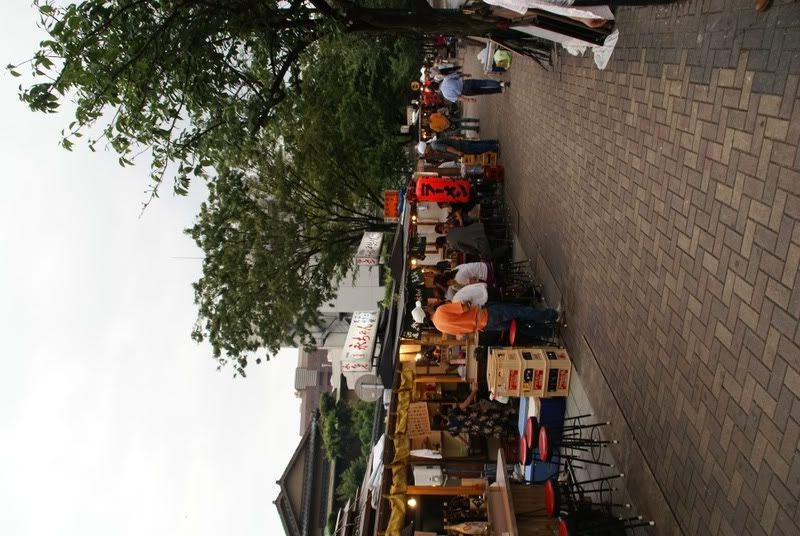
And for some incoherent musings.
Green things in Japan: I was talking to me'ma' before I left about the lack of grass in Japan. Japanese cities are full of 'parks' which involve little more that 2 benches, some gravel and a tree. There's much about Japan I love, this I do not. I initially blamed this situation on the same forces that don't bury the power cables like they do in every other developed country, that don't design buildings with any reference to their surroundings and that fail to understand how vending machines and tacky tourist shops may take away some of the experience of beautiful and ancient sights when placed near enough to appear in pictures of these sights. I think though it may have more innocent origins. I don't think grass grows very well in Japan. Taking the train a long distance, I've covered over 6 hours worth of Japan, you get a feel for the Japanese environment. There's loads of green, the endless mountain ranges are entirely covered by forest and suburbs are surrounded by, and filled with green rice paddies. However, when you see grass, it's usually a bit weak, a bit patchy. It's not so much the administrative cluelessness that is responsible for the other visual blights of modern Japan as the wrong soil and climate, I assume. I suppose there's not much that can be done, and the green of the forests and rice paddies is lovely in its own way. What I miss about England is not then the green, but the green you can sit on. Japan is obviously not a picnicking nation.
Final thoughts on Oliver Sack's "The Man who Mistook his Wife for a Hat" - read it! Half psychological case-studies, half amusing character stories, none of it fiction, it's a very well written collection about different people with different weird mental afflictions. The man who mistook his wife for a hat had perfectly decent vision, but he could only take in small details from a scene and never the whole scene. He could see a nose shape and the curves of a mustache but not recognize a face as a whole. Also good is the 50 year old man who had no long or short term memory at all after 1945, so he thought he was 15, and the man who could not recognize his leg as his own, and in horror at finding another man's leg in his bed, threw it and himself on the floor.
And some misc. photos:
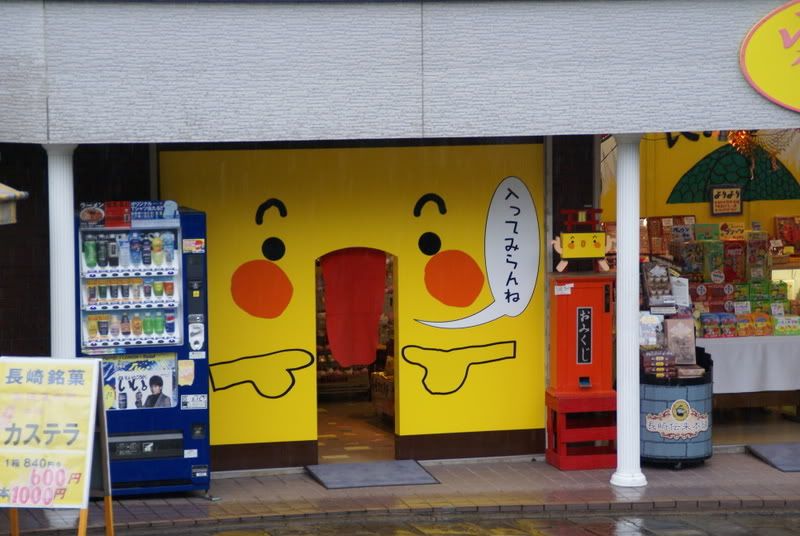
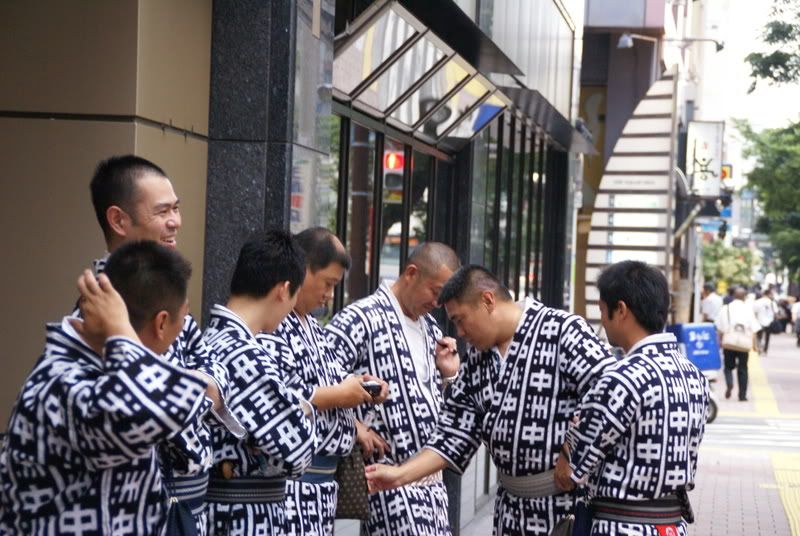
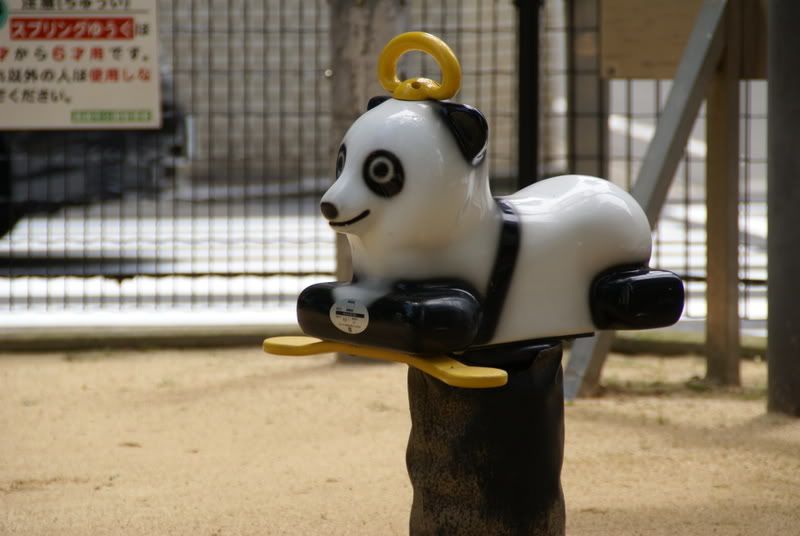
Muchos tired now, 2:49, night night x
I might get a bit history-y here, so for those of you not inclined to that sort of thing you can skip to the pictures.
Yesterday was my last day in Nagasaki, and I spent it quite happily as a shameless tourist. To westerners, the name Nagasaki usually only rings bells in its connection to Hiroshima. It has secured its place in history by being the second of the only two cities in the world to have experienced the horrors of the atom bomb. It is this Nagasaki I explored for the second half of my day, it is an older Nagasaki I explored for the first.
In Japan Nagasaki is known for being the first port to open to the western world. For a country known for it insularity, Japan has a surprisingly old and deep connection with the West. As early as the 8th century Japanese aristocrats possessed goods from Rome and Greece, brought via cultural exchange with China. In the 15 hundreds, not long after the dawn of the colonial era, Portuguese ships found Japan and hoped to spread Christianity and made some money - the two have often gone together. Nagasaki was the city that received them. The Portuguese eventually left as a ban was placed on missionary work - the Japanese shogun thought this foreign God a rival for people's loyalty, and only the Dutch - obviously - were willing to stick to trading. The people of Nagasaki kindly built a manmade island for the Dutch, to keep them off the sacred mainland. I visited this:


Later when Japan was opened (at the point of the American gun) to the West as a whole, Nagasaki remained something of an international hub. I visited Glover Park, a large park with Western houses built by English expats in the late 1800s:

It may sound a bit silly, but I suppose I feel some kind of connection to these early Ango-Japanese cultural ambassadors and find the topic of Japan's relation to the West as a whole one of great personal, as well as academic, interest.
So that's old Nagasaki, a rather beautiful city which at one point was full of European architecture and a rather liberal meeting point of cultures. A strange target for a bomb that was aimed at Japanese ultra-nationalism.
I went to ground zero, the spot where the bomb was dropped, it's marked tastefully by a simple black monolith:

As you look around and see the clean, tacky, lively, touristy, ugly, friendly city that surrounds you it's surreal and not a little depressing to think of the wasteland created here 63 years ago. The rain was certainly fitting. I then went to the Atomic Bombing Museum, it was nearly closing time so I had to - I just stopped myself using the term blitzkrieg - hurry, and I didn't get a chance to read the testimonials and the like. It was all done, for the most part very factually, simply saying the events as they happened, and letting the pictures and artifacts speak the tragedy for themselves. It was very moving. But the historian in me can't stop thinking.
I was annoyed at the way the events were not put into a context. Certainly the tragedy of the bombing deserves recognition by itself but to not to talk of the War as a whole, to not talk of Japanese actions in China, Korea, Taiwan etc. is to paint the Americans as "inhuman" (this world was used in the museum) monsters which surely they were not. On the one hand you have the gut instinct, the common sense approach as it were, which no doubt all decent people feel when they see the images of the charred corpses and the birdseye photos of before and after, when the think about the 150,000 people - I won't here imply that the lives of women and children are worth more than those of men as the museum seemed to in quoting their figures separately - is that this was a needless tragedy, never ever again. But there's the historian. Would an American invasion have been preferable? Had the war not ended then, had it dragged out longer, the Russian's would have certainly been able to build a stronger case in favor of them having an involvement in the occupation - was it Hiroshima and Nagasaki that allowed Japan to avoid Korea's fate: permanent division? So while feeling terribly sad all of this is going through my head. I sometimes wish I was stupid.
Anywho, that was Nagasaki, and it was good.
Fukuoka has little in the way of sightseeing. It's got some temples and shrines, but with going to Kyoto in a few weeks I'm not sure if I'll bother. It's got a big sports area where they play baseball, which I suppose is exciting if you like baseball. I imagine designing the front cover to tourist brochures must be difficult here, because there's no Big Ben, no Eiffel Tower, no iconic image of Fukuoka and no attraction everyone should see. It was however, rated the best "retail city" in the entire world, above even Tokyo, by this poncey design/life style/fashion/food magazine and it's known for it's good food. Walking around today, I can only say that the food and shops are rather wonderful (bought noting yet, I'm ever so restrained~) and it does have a vibe in the air and people that is certainly nothing like Tokyo or Osaka. It's a confident city, friendly to outsiders, be they from Tokyo or London, but unfazed by its relative obscurity. It has this amazing, unique type of bar, they consist of a counter, with a grill and various utensils for cooking yakitori (grilled chicken), ramen (noodles) and other cheap and cheerful Japanese grub (the best word to describe it) and a bar with enough seats for about 8/9 people. These are entirely outside, on the side of the pavement. They're the kind of place designed to get strangers talking, screw the Japanese sense of reservation - where're you from, what do you do, where in Fukuoka has the best coffee?

And for some incoherent musings.
Green things in Japan: I was talking to me'ma' before I left about the lack of grass in Japan. Japanese cities are full of 'parks' which involve little more that 2 benches, some gravel and a tree. There's much about Japan I love, this I do not. I initially blamed this situation on the same forces that don't bury the power cables like they do in every other developed country, that don't design buildings with any reference to their surroundings and that fail to understand how vending machines and tacky tourist shops may take away some of the experience of beautiful and ancient sights when placed near enough to appear in pictures of these sights. I think though it may have more innocent origins. I don't think grass grows very well in Japan. Taking the train a long distance, I've covered over 6 hours worth of Japan, you get a feel for the Japanese environment. There's loads of green, the endless mountain ranges are entirely covered by forest and suburbs are surrounded by, and filled with green rice paddies. However, when you see grass, it's usually a bit weak, a bit patchy. It's not so much the administrative cluelessness that is responsible for the other visual blights of modern Japan as the wrong soil and climate, I assume. I suppose there's not much that can be done, and the green of the forests and rice paddies is lovely in its own way. What I miss about England is not then the green, but the green you can sit on. Japan is obviously not a picnicking nation.
Final thoughts on Oliver Sack's "The Man who Mistook his Wife for a Hat" - read it! Half psychological case-studies, half amusing character stories, none of it fiction, it's a very well written collection about different people with different weird mental afflictions. The man who mistook his wife for a hat had perfectly decent vision, but he could only take in small details from a scene and never the whole scene. He could see a nose shape and the curves of a mustache but not recognize a face as a whole. Also good is the 50 year old man who had no long or short term memory at all after 1945, so he thought he was 15, and the man who could not recognize his leg as his own, and in horror at finding another man's leg in his bed, threw it and himself on the floor.
And some misc. photos:



Muchos tired now, 2:49, night night x


0 Comments:
Post a Comment
Subscribe to Post Comments [Atom]
<< Home